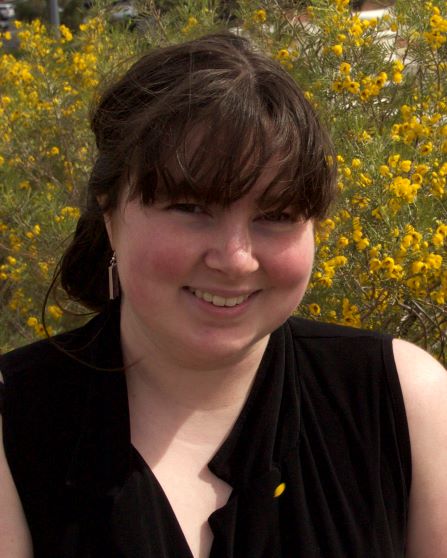Editor’s Note: This exchange is part of a series of brief interviews with emerging writers of recent or forthcoming books. If you enjoyed it, please visit other interviews in the I’ve Got Questions feature.
- What’s the title of your book? Fiction? Nonfiction? Poetry? Who is the publisher and what’s the publication date?
My latest book is a poetry collection called Drowning in the Floating World. It was published in March 2020 by Press 53.
- In a couple of sentences, what’s the book about?
The collection is about the 2011 Tohoku Earthquake and Fukushima Powerplant Disaster. It explores ideas of disaster, ruin, water, man’s impact on the environment, and hope—how do we find hope in tragedy?
- What’s the book’s genre (for fiction and nonfiction) or primary style (for poetry)?
I like to write narrative poems—I want readers to be able to access and engage with the content whether they like poetry, have studied it, or not. There are some literal poems, as well as surreal—I drew a lot of inspiration from Japanese mythology, as well as the incredible Japanese poet Shuntaro Tanikawa, who puts the magical in the everyday.
- What’s the nicest thing anyone has said about the book so far?
Well first off, the nicest thing said was by Chris Forrest at Press 53—that he wanted to publish it! I couldn’t have asked for a more thoughtful, thorough editor than Chris. He gave these poems so much love. I’m eternally grateful.
But from reviewers, the nicest thing they’ve said is that that they get it. That they see what I’m trying to say. The poetry community is amazing, I’ve gotta say. People have really been so kind, generous and thoughtful when reading these poems, which is the best thing I could ever ask for.
Some of my favorite reviews were published in Free State Review, The Sundress Blog, and DMQ Review
- What book or books is yours comparable to or a cross between? [Is your book like Moby Dick or maybe it’s more like Frankenstein meets Peter Pan?]
Patricia Smith’s Blood Dazzler meets the aesthetics of Shuntaro Tanikawa. If you like Haruki Murakami’s work, you may like the Japanese magical realism vibe in these poems too.
- Why this book? Why now?
I couldn’t get away from this content. It haunted me until I wrote it out. 2011 was just 10 years ago but it’s so easy to forget and move on. We cannot forget disaster and the people affected. We have to educate ourselves and listen and remember.
The book came out right when the pandemic was hitting the states—and suddenly, these poems about disaster and fear of contamination struck home in a whole new way, both with me and my readers. I started reading “Response to the Brother Who Wants to Move in After the Earthquake” at online events—the poem is about fear about radioactive contamination from Fukushima—and it suddenly felt even more pertinent in a time of fear about COVID and social distancing.
- Other than writing this book, what’s the best job you’ve ever had?
I’ve had so many great jobs; I’m so grateful. I’ve worked as a research assistant at a language lab. I’ve had training for running an fMRI scanner. I’ve sold advertisements for a literary organization—and worked writing conferences as part of my job! Right now, I’m a creative writing teacher and that’s my favorite job in the world. Getting to be a part of other writers’ writing journeys is the most rewarding experience.
- What do you want readers to take away from the book?
I want readers to learn about 3/11, but I also want readers to contemplate hope—where do we find hope in tragedy? Where do you as a reader find meaningful hope? My last section of poems explores the floating world—the Edo period term for the fleeting pleasure of an Epicurean zeitgeist—and as I played with that word floating, I thought about literal floating in water—how water kills, but it also sustains—as well as this term floating world, and how we can seek hope and meaning in ultimately fleeting ways. It’s easy to seek fleeting comfort and try to forget our painful experiences, but does this serve long-term value? If we forget and can’t reconcile with pain—and in the case of the tsunami, learn and teach the next generation how to minimize the effects of disaster—what is the gain?
- What food and/or music do you associate with the book?
This book transports me back to Japan, my heart home. I want onigiri, katsudon, tempura, miso soup—all that good stuff! Music-wise, I listened to the Dear Esther and FTL soundtracks quite a bit while writing, so those are what come to mind—though I also listened to some old Japanese pop classics like “Sukiyaki” (Ue o Muite Arukō) throughout. And of course, NHK’s collaborative single “Hana Wa Saku” in response to 3/11 always comes to mind.
- What book(s) are you reading currently?
I just finished The Land of Forgotten Girls by Erin Entrada Kelly, and am currently reading Chlorine Sky by Mahogany L. Browne and Genesis Begins Again by Alicia D. Williams.
Learn more about Meg at her website.
Buy the book from the publisher, Politics & Prose Bookstore, or Bookshop.
Check out her upcoming events.


